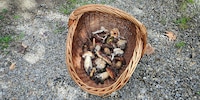

Brussels sprouts, spinach and grapefruit – why bitter compounds are healthy
Even in the womb, babies react to the taste of bitter foods – by making a face. Can you relate even as an adult? Then this article is for you.
Denatonium benzoate is considered to be the most bitter synthetic substance in the world. The yellow plant gentian is a natural alternative on the same level. If you were to dissolve just one shot glass of amarogentin, the compound responsible for gentian’s bitter taste, in 58 million litres of water (equivalent to about 26 Olympic swimming pools), the water would still taste bitter (link in German).
But bitter compounds are no homogeneous chemical group. Bitter substances come in many forms – in chicory, radicchio, cabbage, Brussels sprouts, spinach, arugula, grapefruit, lemon... If you like (wild) herbs, you’ll also find them in dandelion, yarrow, nettle, lovage, chervil, tarragon and peppermint.
The fact that people can have an aversion to bitter substances (too high a dose can even cause retching) is due to taste buds on the tongue and in the oral cavity. Bitter taste receptors relay the taste to the brain, which then releases the appetite-regulating hormone cholecystokinin – a natural brake on eating, so to speak. From an evolutionary point of view, the perception of something as bitter acts as a warning against consuming what may be poisonous food.
But «bitter = poisonous» is no general truth. For example, cucurbitacin in cucurbits is indeed toxic in high doses, and you should also stay away from zucchini that tastes extremely bitter (link in German). However, many other bitter foods have a healthy effect on your body.
Bitter receptors throughout the body
Over the past 20 years, researchers have discovered bitter substance receptors not only on the tongue, but also in many other parts of the body, such as in the muscle cells of the digestive organs, in the bladder, and in the lungs and bronchial tubes. As physician Yael Adler writes in her self-help book «Genial vital!» (Engl.: Brilliantly vital) (book in German), these receptors «alter immunological reactions, the thyroid function and the absorption of nutrients from the intestine. Bitter receptors are also found in the skin and brain, but with an as of yet unclear function.»
Mankind has known about the healthy effects of bitter substances for a long time. Ayurvedic medicine already used bitter medicinal herbs five thousand years ago, as did Hildegard von Bingen in her monastery medicine and Sebastian Kneipp in his naturopathy. Swedish bitters, made famous in the 18th century as a panacea, is also based on bitter herbs. It’s said to be a variation of Paracelsus’s «elixir for a longer life» («elixir ad longam vitam») 200 years earlier. In the Middle Ages, folk knowledge about bitter herbs and foods was that they’re healthy for you.
Bitter vegetables cultivated to be milder
But in the 20th century, even before the discovery of bitter substance receptors throughout the body, bitter substances suddenly lost their importance from a medical point of view. «They were being used only as an appetiser and bitters to stimulate the appetite, and were increasingly being bred out of vegetables,» three researchers from the Department of Dermatology and Venereology at the University Medical Center Freiburg wrote in their 2017 article for the HAUT journal (link in German).
Why is that? It probably comes down to the food industry’s interests. Namely, that milder, or even sweeter, vegetables sell better than bitter ones. What’s interesting is that not everyone tastes bitterness to the same degree; there are genetic differences. And, as a rule, children are particularly averse to bitter foods – even as unborn babies in the womb, as proved by this study published in Psychological Science. If their mothers ate (sweet-tasting) carrots, the foetuses responded with a smile. On the other hand, when their mothers ate bitter food, like kale, they made a «cry-face».
Why bitter substances are healthy
Let's get down to brass tacks: what exactly makes bitter substances so healthy? First, they curb the appetite. Second, they have a digestive effect by stimulating saliva and gastric, bile and pancreatic juices (link in German) via the bitter taste receptors. It also increases movement in the gastrointestinal tract – good for digestion and the breakdown of micronutrients. The increased bile flow also benefits the liver, which is great for blood lipid levels and cholesterol.
The result? The feeling of being full. Bitter components act as a natural brake on eating and can prevent cravings for sweets. Traditional Chinese medicine has known this for a long time, classifying bitterness as an antagonist to sweetness. If you still can't imagine how to incorporate chicory and the like into your diet, Manuela Rüther’s cookbook (only available in German) might help get you started.

«Your perception of bitterness will differ from mine,» she writes on her blog; bitter notes are as numerous and diverse as the chemical compounds behind them. It’s possible you simply haven’t found the one that’s right for you. In any case, the verdict of photographer and cookbook author Manuela Rüther is clear: «Wow, awesome taste! It’s doing something to my palate. I want more!»
Header image: Shutterstock
I could've become a teacher, but I prefer learning to teaching. Now I learn something new with every article I write. Especially in the field of health and psychology.
Interesting facts about products, behind-the-scenes looks at manufacturers and deep-dives on interesting people.
Show allThese articles might also interest you

Background information
Why picking mushrooms with your family is fun, even without specialist knowledge
by Martin Rupf

Background information
Living longer, ageing healthier: learning to age better
by Mareike Steger

Background information
Medicinal plants for men: Natural help for prostate problems, hair loss and potency disorders
by Moritz Weinstock